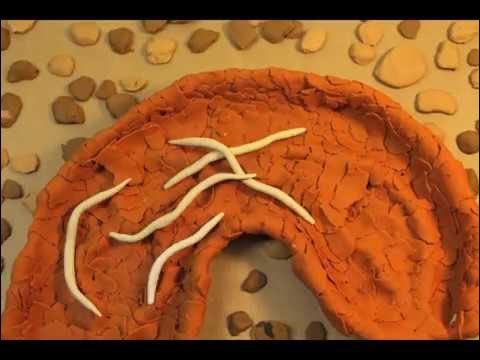How Nematodes Damage Plants
Summary
TLDRNematodes, such as root knot nematodes, are microscopic worms that cause significant crop losses by attacking plant roots, leading to poor growth and reduced yields. Bayer's fluopuram, a chemical nematicide, is applied through drip irrigation to target and paralyze these pests, while BioAct, a biological alternative, attacks nematode eggs to prevent new infestations. Both solutions promote a healthy root system for robust plant growth and high yields, illustrating the importance of scientific innovation for sustainable agriculture.
Takeaways
- 🐛 Nematodes cause significant damage to fruits and vegetables worldwide.
- 🌱 Root knot nematodes are a type of eel worm that live in the soil and attack plant roots.
- 🔍 Nematodes penetrate roots, reproduce, and cause root galling, leading to poor plant growth.
- 💧 They extract water and nutrients from the root system, weakening the plants.
- 🛡️ Fluopiram from Bayer is a chemical solution that stops nematode attacks.
- 🚿 The active substance in Fluopiram is applied through a drip irrigation system to target the roots.
- 🐛 Treated nematodes become paralyzed and die, preventing further damage.
- 🌿 Bayer's biological nematicide, BioAct, targets remaining nematode eggs.
- 🌱 BioAct, applied via drip irrigation, uses a fungus to parasitize and destroy nematode eggs.
- 🌱 A healthy root system, supported by these treatments, leads to robust plant growth and high yields.
Q & A
What are nematodes and how do they affect crops?
-Nematodes are tiny eel-like worms that live in the soil and attack plant roots. They cause heavy yield and crop losses globally by penetrating the roots, reproducing, and causing root galling, which leads to poor plant growth and nutrient and water deprivation.
How do nematodes reproduce and harm the plant roots?
-Nematodes reproduce by penetrating the root system, where they start to reproduce and cause root galling. This process weakens the plant, leading to poor growth and health.
What is fluopiram and how does it help in controlling nematodes?
-Fluopiram is a chemical from Bayer that stops nematode attacks. Its active substance is applied to the soil through a drip irrigation system, targeting the root system precisely. Treated nematodes become paralyzed and die off, preventing further damage.
How does the application of fluopiram through drip irrigation help in targeting nematodes?
-Applying fluopiram through drip irrigation allows for a precise delivery of the active substance directly to the root system, ensuring that the nematodes are effectively treated without affecting other parts of the plant.
What is Bayer's biological nematicide BioAct and how does it work?
-BioAct is a biological nematicide from Bayer that destroys remaining nematode eggs. It can be applied directly via a drip irrigation system, where it parasitizes the nematode eggs, preventing the larvae from hatching and infecting new roots.
How does the fungus in BioAct contribute to the control of nematodes?
-The fungus in BioAct starts to parasitize the nematode eggs, which prevents the larvae from hatching, thus controlling the nematode population and protecting the plant roots.
What benefits does a healthy root system provide to plants?
-A healthy root system enables good plant growth and high-yield production by effectively absorbing water and nutrients, which are essential for the overall health and productivity of the plant.
How do fluopiram and BioAct complement each other in nematode control?
-Fluopiram targets and paralyzes adult nematodes, while BioAct focuses on destroying nematode eggs and preventing the hatching of larvae. Together, they provide a comprehensive approach to controlling nematode populations.
What is the role of drip irrigation in the application of nematicides?
-Drip irrigation plays a crucial role in the application of nematicides by ensuring that the treatment is delivered directly to the root zone, maximizing the effectiveness of the nematicides and minimizing the impact on the environment.
How does the control of nematodes contribute to fair science for a better life?
-Controlling nematodes through effective and targeted treatments like fluopiram and BioAct contributes to fair science by promoting sustainable agriculture practices, which in turn leads to better crop yields and improved food security.
Outlines

此内容仅限付费用户访问。 请升级后访问。
立即升级Mindmap

此内容仅限付费用户访问。 请升级后访问。
立即升级Keywords

此内容仅限付费用户访问。 请升级后访问。
立即升级Highlights

此内容仅限付费用户访问。 请升级后访问。
立即升级Transcripts

此内容仅限付费用户访问。 请升级后访问。
立即升级5.0 / 5 (0 votes)






